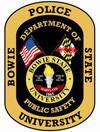Emergency Preparedness
Bowie State University Emergency Preparedness
View the 2025 Emergency Management Plan (pdf)
- Avian Flu Pandemic Plan - Bowie State University will implement this plan to respond to a Swine Flu pandemic.
Campus Coordinator
The president has designated the Vice-President for Administration and Finance, to oversee campus emergency planning, prevention, preparedness, response, and safety and security.
Lines of Authority
The establishment of clear lines of authority for overseeing and managing emergency incidents and responding to emergencies, based on principles of Incident Command Systems (ICS) and National Incident Management Systems (NIMS), are the responsibility of the BSU Incident Commanders:
- Captain James Booker, Interim Chief of Police / Director of Public Safety
- Lieutenant. Lashelle Powell, Patrol Operation’s Commander
- Lieutenant. Lisa Bell, Commander of Investigations
- Shift Sergeant
- OIC
- Or first responding sworn University police officer
Campus Emergency Preparedness Committee
The BSU Emergency Preparedness Committee (EPC) meets quarterly to monitor and update the EPP to ensure accurate contact information, ICS, building and campus plans, as well as to address new types of threats.
Local & State Responders
Memorandum of Understanding (MOUS) for Coordinated Relations
Coordination with appropriate local and state emergency responders, including communication systems to be used in the case of a serious incident or major disaster have been established with the following:
- Maryland State Police Department
- Prince George's County Police Department
- Bowie City Police Department
- Old Bowie Volunteer Fire Department # 19
An Emergency Operations Center (EOC) for use in response to specified emergencies has been established in Charlotte Robinson Hall (location of the Police Dispatch Operation). Use of satellite phones and emergency network radios will be used to support Emergency Operations Centers (EOC). [All sworn police personnel use Vertex Standard handheld radios which support communication with the Prince George's County 911 system.]
Behavioral Assessment Team
Our multi-disciplinary Behavioral Assessment Team reviews reports and takes appropriate action on potentially distressed or disturbed members of the campus community, including students, staff, and faculty. The team receives up-to-date training from the Counseling Office and other entities as needed. The training for the team as well as the faculty and staff occurs during the semiannual Faculty Development Institute at the start of the fall and spring semester and annually at the Staff Development Institute in the fall.
Risk Assessment & Planning
- An annual risk assessment that reviews a comprehensive range of threats, including natural disasters, hazardous materials, terrorism, violent crime, and pandemic diseases, and identifies the top hazards faced by the campus and those that could result in a significant loss of life is conducted under the direction of the chief of Bowie State University police. The chief of police is trained to respond to most public safety threats. Outside consultants will be brought in as dictated and needed.
- The University is currently undergoing a review of its entire operation as required by the standards established by the International Association of Campus Law Enforcement Agencies. The assistant chief of police is currently leading the effort to seek certification from IACLEA. The self review process started in FY 2008/2009. Certification of the process is expected to be complete by September 2013.
- To address a plan for the appropriate mitigation actions for top hazards, including both short-term and long-term incident planning, evacuation planning and shelter in place, the University has received written proposals to provide a comprehensiveThreat Assessment for Bowie State University in agreement with USM policy on campus emergency planning, preparedness and response. This project is ongoing as a result of the associated cost and the required bidding process.
- In the spring of 2008, Bowie State University was the first University in Prince George's County to receive training and certification as a CERT (Community Emergency Response Team).The training was provided by the Prince George's County Office of Homeland Defense as a vehicle to better prepare the campus community and local community in case of a major crisis. The CERT members are students, staff and faculty members. They receive annual training from the Homeland Defense department.
Regular Testing of the EPP
Regular Table Tops Sessions have occurred and are ongoing for various segments of the campus community:
- President's Cabinet (3 sessions)
- EPP Committee and Pandemic Flu Committee (5 sessions)
- Student Government Association (1 session)
- Student Affairs Leadership Team (1 session)
BSU has developed Operation Restore Calm. Operation Restore Calm is table top exercise program design to expose faculty, staff, students and top administrators to potential high-risk incidents in which they will need to interact with various components in crisis management situations.
Regular training for the campus community on emergency response plans have been provided for key emergency response staff and other members of the campus community, including staff, faculty, and students. Information sessions have occurred and will continue to be convened at the Faculty Development Institute each semester, the Staff Development Institute when scheduled, during regular training for emergency building coordinators, for the EPP committee, and for the SGA Officers, resident hall staff and resident assistants.
Communicating an Emergency
The BSU communication plan will advise the campus community of the emergency warning systems through the following mediums:
- BEES (Bowie State Electronic Emergency System) Alert System
- Voice Over Siren System
- Email Notification System
- Web Site Postings
- Posting System in Residence Halls
Communications Plans
BSU has established the following plan for communicating with the campus, surrounding communities, the USM office, Board of Regents, families, and media in the case of an emergency incident.
Communications will be maintained via the use of the web, e-mail, telephone, and the BSU and external media depending upon the continued availability of each of these options. Coordination of this area of response will be handled by the director for university relations and marketing who may identify a key spokesperson for the media interviews. A representative from the Office of the President will contact the Office of the Chancellor and inform the chairperson of the board of regents as conditions dictate. Specific plans for communications are outlined.
- Web - An emergency preparedness site will be developed and linked to the University's top level page. It will be used to broadcast information of a general nature, including general campus status information, and specific emergency awareness information. As needed, the University Web page will include links to other useful information. Updating can be done either on or off campus as conditions dictate.
- Media - Critical messages will be disseminated by media relations staff via newspaper advertising, commercial and public radio broadcast messages. The University may also utilize BSUTV and 1640 AM, the traffic radio station, to reach people coming to the campus or in the immediate vicinity.
- Telephone -University landline telephones will be supported with essential staff and will include all current telephone lines. These telephones can be used to disseminate critical information to the campus via recorded voice mail messages. Cell phones may also be used for direct communication with critical employees as needed, depending upon continued service through the Bowie Emergency Electronic System (BEES campus network).
- E-mail- Existing mechanisms are in place for authorizing and sending mass e-mail to the campus community. As the situation develops, e-mail services for general use will be supported with essential staff and will include all faculty, staff, and student accounts as well as listserv services.
Student Involvement
BSU has set up the following mediums to advise, involve and solicit feedback from students on issues of campus safety and security and emergency preparedness:
- Regular meetings with SGA/GSA Officers
- Meetings each semester in the residence halls
- Announcements and instructions at student body meetings which includes commuters students
- Students serve on the BSU Campus Police Department Advisory Committee
MOU'S for Coordinated Relationships
Bowie State University has established written MOUs and partnered with the following public safety agencies partners in our EPP.
- Maryland State Police Department (copy on file in police headquarters)
- Maryland Transit Administration Police Department (copy on file in police headquarters)
- Prince George's County Police Department (pending revision and legal review)
- Bowie City Police Department (MOU under consideration)
- Prince George's County Volunteer Fire Department #19 (Prince George's County Fire Department do not require a written MOU to provide fire services to Bowie State University)
Continuity of Operations Plans
A Continuity of Operations Plan (COOP) for the continuation of essential functions in the case of an incident with a long-range impact on the campus, including business operations and academic and research programs are being updated and refined. The COOP acts as a supplement to the EPP.

